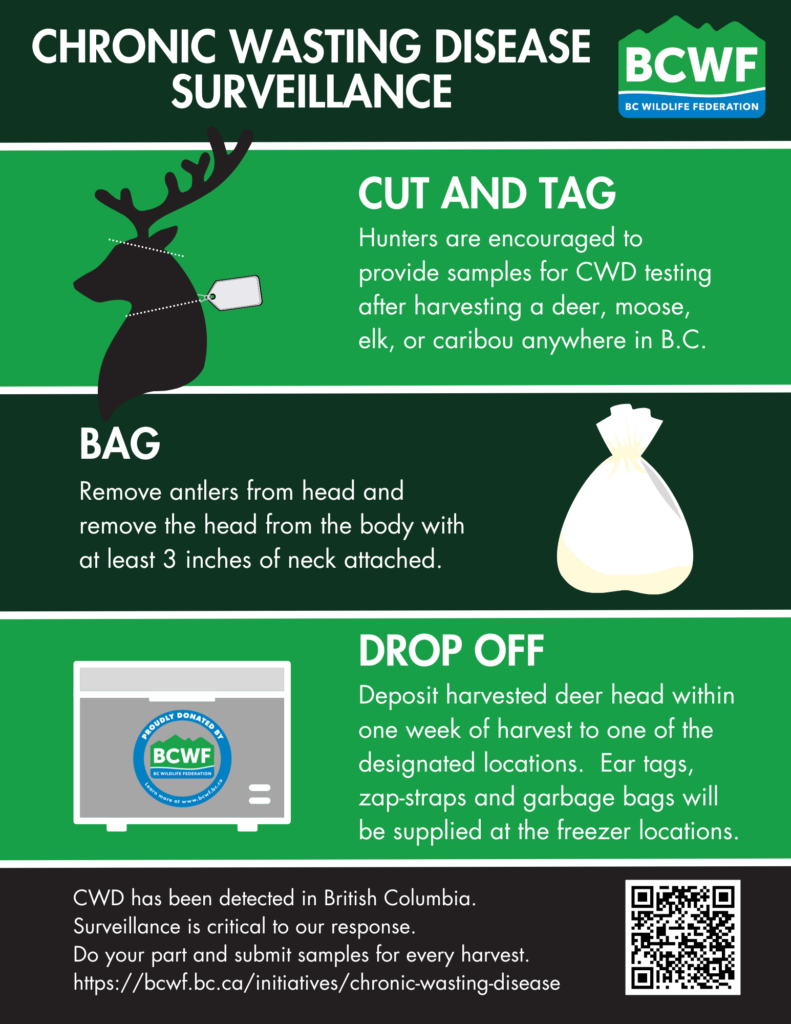Chronic Wasting Disease has been confirmed in British Columbia.
Be aware that there are mandatory submissions for CWD in highest-risk areas and voluntary submission everywhere else.
Chronic Wasting Disease (CWD) is a prion disease affecting the deer family (cervids), including moose, elk, and caribou. The disease is 100 percent fatal, with no known treatment. It is not known to affect humans or livestock.
Submission of samples for CWD testing is mandatory for white-tailed & mule deer harvested in MUs 4-1, 4-2, 4-3, 4-4, 4-5, 4-6, 4-7, 4-8, 4-23, 4-24 and 4-25 within one week of harvest, but hunters are encouraged to provide samples after harvesting a deer anywhere in B.C.
In many cases, antlers must be kept by the hunter and accompany the carcass when transporting to the place of residence. Antlers and hide (cape) can be kept by the hunter and used for taxidermy.
Chronic Wasting Disease...What is it?
Chronic Wasting Disease (CWD) is a degenerative neurological disease that affects species in the deer family (cervids) and is caused by an abnormal protein called a prion. As the prions accumulate, they cause cell death in the brain and neurological disease, which is 100-per-cent fatal. Prions also accumulate in other tissues and may be shed by the infected animal into water or on plants and bedding through saliva, urine and feces.
The origins of CWD are not known but the disease was first described in captive mule deer and elk in Colorado and Wyoming in the 1960s, followed by positive diagnoses in free-ranging deer and elk populations.
The B.C. Wildlife Health program has been doing surveillance for CWD in free-ranging cervids since 2002. Thousands of samples have been tested. The first positive test results were announced on February 1, 2024 in two deer in the Kootenay region, south of Cranbrook.
The first positive sample was taken from a male mule deer, from an animal that appeared to be in good condition. However, a sample sent to the B.C. CWD Program by the hunter came back positive for this devastating illness.
The second sample was from a road killed animal, a female white-tailed deer and was submitted to the B.C. CWD Program for testing. The diagnosis was confirmed by the Canadian Food Inspection Agency reference laboratory on January 31, 2024.
CWD can travel quickly and jump regions due to the transport of animals, hay, or other materials that have come into contact with wild deer.
Deer can be infected and contagious without looking ill. Do not assume that a deer that looks healthy is not infected.
Note that no other wildlife, including mountain sheep, mountain goats, bears, or coyotes are known to be affected by CWD.
Surveillance is key to understanding the disease risk of CWD in British Columbia. For this reason, all hunters are encouraged to submit their deer, elk or moose heads for CWD testing.
“This has been one of our greatest fears for years,” said BCWF Executive Director Jesse Zeman, in response to the announcement of a positive test. ” It wasn’t a matter of if, it was a matter of when. British Columbia’s challenge now is we have one of the most under-funded fish and wildlife management jurisdictions in North America. Without adequate funding and a measurable response, BC will limp this along and allow it to spread throughout the province.”
What can you do?
- Submission for CWD testing is mandatory for white-tailed & mule deer harvested in MUs 4-1, 4-2, 4-3, 4-4, 4-5, 4-6, 4-7, 4-8, 4-23, 4-24 and 4-25 within one week of harvest.
- All hunters in B.C. are encouraged to submit their cervid heads to the BC CWD Surveillance Program at one of the designated drop-off locations.
- As per the Hunting and Trapping Regulations Synopsis, it is unlawful “to possess any part of a Cervidae (caribou, deer, elk, moose), that was killed outside of British Columbia, other than (1) the edible meat of the four quarters, loins, neck, and ribs, or (2) the hide, antlers, and skull plate if, before being brought into British Columbia, the part is cleaned in a manner that removes all tissue.” Ensure the high risk tissues (brain, spinal cord, lymph nodes and organs) are left where you harvest the animal and return only with the meat, antlers with cleaned skull plate and/or hide (in a sealed container) with all tissue removed.
Please report any sick or unusually thin animals to the RAPP line at 1-877-952-7277.
Chronic Wasting Disease Information
CWD is a disease of the central nervous system, caused by infectious agents called prions. As the prions accumulate, they cause cell death in the brain and neurological disease, which is 100-per-cent fatal. Prions also accumulate in other tissues and may be shed by the infected animal into water or on plants and bedding through saliva, urine and feces.
Conservation Webinar Series Presentation, September 19, 2023:
Here are some links where you can learn more about Chronic Wasting Disease and British Columbia’s response to positive cases:

